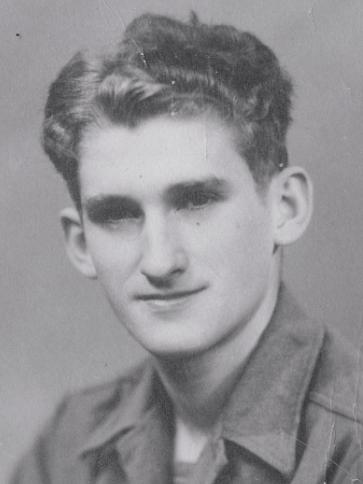|
Norris E. VanCleave |
|
My Christmas in the Ardennes: A reminiscence
By Norris E. VanCleave
It was after Christmas, 1944. How many days after I have never been able to figure out, but the important thing to me was not when it was, but that my Christmas, 1944, had not been fulfilled. As a 117-pound, 19-year old Infantry draftee, I had just spent my first Christmas season away from a 157-acre Louisiana farm home where I had been the youngest child in an all-boy family of nine. The Ardennes Forest had dropped snow into the turned-up collar of my overcoat, an experience as foreign to me as the sight of the frozen dead men up near the Siegfried line. On the evening of December 15, 1944, the 12-man rifle squad in which I was a buck private had resisted a late-evening attack on an artillery observation post. The post was in the attic of the three-story building where we were quartered. The dozen or so Germans had all been killed. Our men were unscratched. The completeness of the victory had at first evoked joy. But later, having to view the dead men in order to see properly to our own defense had become a gruesome experience to me. On the 16th, the Germans attacked on each side of us but we did not see combat. We were left to view the kill of the evening before. A welcome break came at about noon, when scores of captured Germans were marched by�evidence that other units in our regiment had been successful in defending the hard-won American positions. But about midnight on the 16th, some devastating news reached my buddy and me. We were pulling guard duty near the .50 caliber machine gun position by the roadside. A German tank offensive had launched a vast drive into American territory. We who had held the more forested areas against un-mechanized attack must now withdraw or also be overrun. Without a moment�s notice, a squad relationship that had begun in the states was broken permanently. The eight men who were off-guard at the time were ordered to stay as rear guard. We four who were on guard joined the rest of our company at the command post. For the retreating forces, it had been nights and days of walking and stopping, with the snow-carpeted forest floor freezing their feet and the snowfall from the trees chilling the upper parts of their bodies. Occasional contacts with enemy forces further endangered the withdrawing troops. Soon, only one out of every four men who had gone into battle with the company remained with it. At last we arrived at a place where a Christmas dinner type of meal was being served to American troops. I began to eat ravenously of this respite from K and C rations. But nearly as quickly as I began I was full, because the sustained diet of concentrated foods had shrunk my stomach. Now the American armored forces had turned the German offense around, and we were moving up to rejoin the fight. Although I was cheered by the news of victory, I remained disappointed in Christmas. There had been no recent mail from home. I suppose that the breakthrough had separated me from correspondence as well as from most of the GIs I had known best. Overall, it had been a rotten Christmas, like no Christmas at all. In early evening, near sundown on a cold winter day, we reached the edge of a Belgian village and began to assemble shelter halves to make tents. I shivered at the thought of another cold night without the warmth of fuel. Suddenly, a company runner came by our tent site and told us to remake our packs and assemble with the company. So now we are going to hike some more, I thought. But we didn�t. Instead, we were going to spend a night indoors! The people of that Belgian village had invited all of us into their homes! My tent buddy and I were ushered into a modest frame home by a middle-aged couple and a little preschool girl. We were offered access to a bathtub and beds, but we declined. We explained that we must keep ourselves ready to go at a moment�s notice. Really, it had been so long since I had had a bath and a change of clothing that I wouldn�t have felt it proper to mar their living conditions. We spread our sleeping bags on a thick living-room carpet and soon fell asleep. When we awakened, a pleasant smell was emitting from the kitchen. We learned it was waffles, a special Belgian treat they usually reserved for Fridays. I never knew whether that was Friday or not, but the waffles were great. As we bade goodbye to rejoin our company, our host and hostess stood at the door. As we shook hands the eyes of our hostess brimmed with tears. I often have regretted that I didn�t get the name of these friends and their village for later contact. I suppose the language barrier kept me from trying to get better acquainted. But I have since accepted that night in their home as the fulfillment of my Christmas season in 1944. Note: This article appeared in the Roanoke Times on December 23, 1985. Norris VanCleave, a former newspaperman, served in the 106th Infantry, 424th division, Co. K. during the Battle of the Bulge.
|
| source: Benita VanCleave 08/28/2013 |
|
|


 Page last revised
10/23/2019
Page last revised
10/23/2019